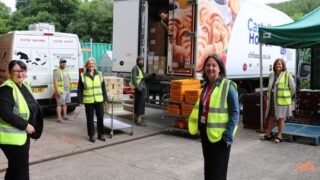The perilous state of local government finances and the future of the sector provoked passionate discussion during the special local government conference.
Angela Waller, speaking for the executive, referenced UNISON research that calculated that, in 2020, councils faced a combined funding shortfall of £10 billion.
To put the figure into context, Ms Waller said the amount local government lost over 10 years of austerity was 15 billion. “So, 10 billion for just one year is huge.”
The impact of a decade of austerity, combined with the effect COVID-19 has had on councils and schools’ costs, raised questions about the long-term viability of the way English councils are funded.
Rounding on the government, Ms Waller put the blame for the problems dogging local government squarely at the door of Number 10. She said the Westminster government “had not provided the long-term financial stability schools and councils need”.
To underline her point, she provided a sobering illustration of the depth of the financial black hole facing councils.
“An LGA member said that, even if councils stop filling potholes, maintaining parks and open spaces, closed all children’s centres, libraries, museums, leisure centres, turned off every street light and shut all discretionary bus routes, they would still not have saved enough money to plug this gap.”
Conference heard that UNISON staff are delivering essential services, doing crucial jobs in stressful environments while being underpaid, and that the COVID crisis has highlighted the sacrifices staff have been making to keep services running.
Delegates pointed out that many members have put themselves in harm’s way, switched jobs to help the most vulnerable, worked in schools when most people thought they were closed and ensured we have clean and safe public spaces.
Conference called on the executive to:
- set out a new bold vision for how local government should operate and be funded across the UK;
- build on the work being done in Scotland and Wales to explore alternative ways to fund councils;
- draw on members’ experiences to set out a proactive view of how local government should operate, be funded, provide services, and ensure local democracy.
Anu Prashar from the LGBT+ group tabled an amendment asking conference to recognise that local government cuts have affected different groups of local government members in different ways, with disadvantaged groups being hit the hardest.
She said: “Year after year, LGBT+ people have seen specific services, whether youth work, domestic violence or mental health services cut. These services were vital then, but the pandemic has shown that they are more important now more than ever before.”
Amina Patel from Tower Hamlets submitted a further amendment, saying: “Hypocritical politicians express concern for the most vulnerable, while many local authorities haven’t even been provided with adequate funding to meet additional COVID costs, and cuts to front line services continue”.
She welcomed resistance to the cuts by members, other trade unionists and community campaigns, and said their action had limited the damage to many services and given voice to those most affected by them.
Mark and Maria from Sefton local government branch also supported the amendment and highlighted the extra work staff have been forced to do to keep services running, as cuts decimated worker numbers.
Conference voted in favour of the motion and amendments and called on the local government service group executive to undertake a number of actions, including:
- continue to campaign for proper recognition of local government services, highlighting the vital role local government played throughout the COVID-19 pandemic;
- call for the investment needed to provide services and safeguard jobs, an end to the austerity politics, and for local government funding to be restored to 2010 levels;
- ensure the campaign is co-ordinated with the devolved nations, to ensure a joined-up approach;
- replicate the work in Cymru/Wales, where UNISON local government activists together with councillors explored the future of local government funding.
How bad are the cuts where you live?





